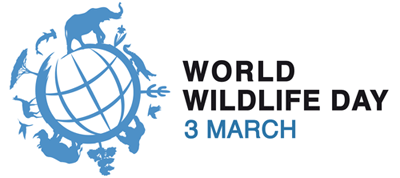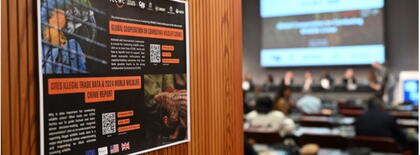For use of the media only;
not an official document.
PRESS RELEASE
World Wildlife Day 2015 – It’s time to get serious about wildlife crime
Organized Crime Threat to Wild Species on the Increase, Says UN on Wildlife Day
UN General Assembly Marks the Day with Special Session

UNDP Administrator, Helen Clark
“World Wildlife Day is an opportunity to celebrate wildlife, but it is also a wake-up call to get serious about wildlife crime. We must all do more to halt the illegal trade in wildlife. UNDP and its partners are committed to this task.”
UNODC Executive Director, Yury Fedotov
"Wildlife crime is a transnational organized crime generating billions of dollars and undermining development. It is also an inter-generational crime that can permanently scar the world through the loss of some of our most beautiful creatures. To stop this, we must act now."
UN Under-Secretary-General and UNEP Executive Director, Achim Steiner
"While there is growing awareness about wildlife crime, the responses to date in terms of impact have not been commensurate with the scale and growth of the threat to wildlife and the environment. The scale of wildlife and forest crime in threat finance calls for much wider interventions and policy action."
CITES Secretary-General, John E. Scanlon
“The situation is serious. We must tackle the poaching, transport and consumption of illegally traded wildlife and in so doing use the same sorts of enforcement tools, techniques and penalties used to combat other serious crimes, such as trafficking in drugs or persons. We know what needs to be done—and by working together we will succeed.”
About World Wildlife Day:
On 20 December 2013, the sixty-eighth session of the United Nations General Assembly proclaimed March 3, the day of the adoption of the Convention on International Trade in Endangered Species of Wild Fauna and Flora (CITES), as World Wildlife Day. This day provides the ideal opportunity to celebrate the many beautiful and varied forms of wild fauna and flora, recall the privileged interactions between wildlife and populations across the globe, and raise awareness of the urgent need to step up the fight against wildlife crime, which has wide-ranging economic, environmental and social impacts.
www.wildlifeday.org
About CITES:
CITES—the Convention on International Trade in Endangered Species of Wild Fauna and Flora—
is an international agreement between governments. Its aim is to ensure that international trade in specimens of wild animals and plants does not threaten their survival. Because the trade in wild animals and plants crosses borders between countries, the effort to regulate it requires international cooperation to safeguard certain species from over-exploitation. CITES was conceived in the spirit of such cooperation. Today, it accords varying degrees of protection to more than 35,000 species of animals and plants, whether they are traded as live specimens, fur coats or dried herbs.
www.cites.org
About UNDP:
UNDP partners with people at all levels of society to help build nations that can withstand crisis, and drive and sustain the kind of growth that improves the quality of life for everyone. On the ground in more than 170 countries and territories, we offer global perspective and local insight to help empower lives and build resilient nations.
www.undp.org
About UNEP:
UNEP, established in 1972, is the voice for the environment within the United Nations system. UNEP acts as a catalyst, advocate, educator and facilitator to promote the wise use and sustainable development of the global environment. UNEP work encompasses:
assessing global, regional and national environmental conditions and trends, developing international and national environmental instruments and strengthening institutions for the wise management of the environment.
www.unep.org
About UNODC:
Established in 1997 through a merger between the United Nations Drug Control Programme and the Centre for International Crime Prevention, UNODC is a global leader in the fight against illicit drugs and international crime, operating in all regions of the world through an extensive network of field offices. UNODC is mandated to assist Member States in their struggle against illicit drugs, crime and terrorism. In the Millennium Declaration, Member States also resolved to intensify efforts to fight transnational crime in all its dimensions, to implement the commitment to counter the world drug problem and to take concerted action against international terrorism.
www.unodc.org
Media Contacts:
CITES:
Juan Carlos Vasquez, juan.vasquez [at] cites.org (juan[dot]vasquez[at]cites[dot]org), +4122 917 8156
UNDP:
Sangita Khadka, sangita.khadka [at] undp.org (sangita[dot]khadka[at]undp[dot]org), +1 212-906-5043
Wynne Boelt, wynne.boelt [at] undp.org (wynne[dot]boelt[at]undp[dot]org), +1 212-906-6860
UNEP:
Laura Fuller, Laura.Fuller [at] unep.org (Laura[dot]Fuller[at]unep[dot]org), +1 202-974-1305
Shereen Zorba, shereen.zorba [at] unep.org (shereen[dot]zorba[at]unep[dot]org), + 254 788 526 000
UNODC:
Simone Monasebian, monasebian [at] un.org (monasebian[at]un[dot]org), +1 917-294-5762
Bianca Newby, Bianca.newby [at] unodc.org (Bianca[dot]newby[at]unodc[dot]org), +43 126060 83107
Spokesperson for the President 69th Session of the General Assembly:
Jean-Victor Nkolo, nkolo [at] un.org (nkolo[at]un[dot]org), +1-212-963-8203



